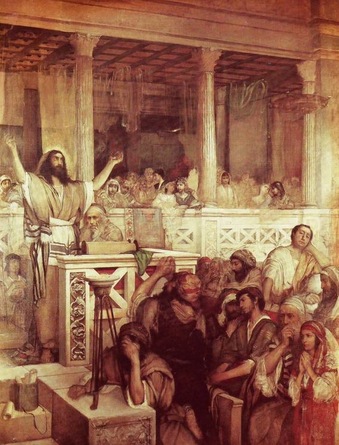Nolite obdurare corda vestra

This painting of Jesus preaching in the synagogue at Capernaum is the work of the Polish-Jewish artist Maurycy Gottlieb (1856-1879). Note that he depicts Our Lord with earlocks, and wearing the traditional talith or prayer shawl.
Fourth Sunday of the Year
Mark 1:21-28
1 Corinthians 7:32-35
Psalm 94: 1-2. 6-9
Deuteronomy 18:15-20
Words from God for God
The genius of the sacred liturgy is that it allows us to respond to the Word of God with the Word of God. God speaks to us in the readings; we respond to him in the words of responsories and psalms, words inspired by the Holy Spirit and placed on our lips by the Church. The Word, which descends into our midst in the proclamation of the readings, becomes in the psalm a chariot of fire by which we, like the prophet Elias of old (2 K 2:11), are carried into the presence of the Father, with the Son, in the Holy Spirit.
The Venite
Today’s Responsorial Psalm is especially significant. It is the Venite, Psalm 94. This is the psalm that begin the Church’s daily round of praise in the Divine Office. Every morning, and in many monasteries before the first glimmers of dawn while the world still sleeps, voices intone Psalm 94. It is more than an invitation to adoration and praise. It pleads with us: “Today if you shall hear His voice, harden not your hearts” (Ps 94:7-8).
Praying Against Oneself
A hardened heart is one that refuses to listen. Encrusted in a shell, it becomes impenetrable even to the piercing grace of God. At times, we have to pray against ourselves. We are obliged to pray against our own hard and stony hearts, if we are to pray at all. The poet knew it well.

“Batter my heart, three-personed God, for you
as yet but knock, breathe, shine, and seek to mend;
That I may rise and stand, o’erthrow me and bend
Your force to break, blow burn, and make me new”
(John Donne, Holy Sonnets V).
The Risk of Listening
To listen is to risk. This is true of every human relationship; it is no less true of the relationship with God. The listening heart is vulnerable, open to being wounded by the two-edged sword of the Word (Heb 4:12) which like the surgeon’s scalpel cuts in order to heal. A heart that listens is softened and melted by the Word received. The mystics tell us that the heart may be liquefied by the fire of love that burns in every utterance of the mouth of God. The disciples on the road to Emmaus knew it. “And they said one to the other: Was not our heart burning within us, whilst He spoke in this way, and opened to us the Scriptures?” (Lk 24:32).
A Word Unlike Any Other
The assembly in the synagogue at Capernaum risked listening to Jesus of Nazareth. They heard his voice. At least, on this one occasion, they did not harden their hearts. Saint Mark tells us that his teaching made a deep impression on them. What they experienced was different from the dry and lifeless teaching they were accustomed to hearing. This was no routine repetition of stale exhortations. Here was a word whose origin was deeper and more mysterious than anything they had heard before. Unlike the scribes, Jesus taught them with authority. His teaching came not from Himself; it came from the One who sent Him (cf. Jn 7:16).
Taught By God
This episode in the synagogue fulfills God’s promises to Moses: “I will raise them up a prophet out of the midst of their brethren like to thee: and I will put my words in his mouth, and he shall speak to them all that I shall command him” (Dt 18:18). The Lord Jesus himself makes it clear in the sixth chapter of Saint John. “It is written in the prophets: And they shall all be taught of God. Every one that hath heard of the Father, and hath learned, cometh to Me” (Jn 6:45).
In the Synagogue
The worshipers in the village synagogue sensed the unique quality of Jesus’ teaching in a confused sort of way. This unique quality was all too clear to the unclean spirit in the man possessed. The unclean spirit clamours, “I know who Thou art, the Holy One of God” (Mk 1:24). Saint Jerome makes an astute observation about this. He says that even if the unclean spirit recognizes Jesus as the Holy One of God, it fails to confess Jesus as he truly is: not simply the Holy One of God, but the Holy God himself.

To Become Wholly Teachable
Jesus speaks. The words of Our Lord are an outpouring, an effusion, an infusion, of the fire and light of his life with the Father in the Holy Spirit. One who really listens, risks being caught up in the life of the Holy Trinity. How I wish that we could all pray as Blessed Elisabeth of the Trinity prayed:
O Eternal Word, Word of my God, I want to spend my life in listening to you, to become wholly teachable that I may learn all from you. Then through all nights, all voids, all helplessness, I want to gaze on you always and remain in your great light.
Power to Attend Upon the Lord
We come to Holy Mass to hearken to the words of the Word, to be wounded by them, to be espoused by them in such a way that, as the one Body of Christ, we are drawn upward with our Divine Head to the Father in the Holy Spirit. A listening Church will be one in which Saint Paul’s goal for the Corinthians is necessarily fulfilled: “power to attend upon the Lord, without impediment” (1 Cor 7:35).
The Name of the Father
We cannot listen to the words of Jesus without being drawn into his own undivided attention to the Father. This was the desire of His Sacred Heart on the night before he died, “I have given them the words which Thou gavest me, and they have received them and know in truth that I came from Thee. . . . I made known to them Thy name, and I will make it known, that the love with which Thou hast loved me may be in them, and I in them” (Jn 17: 7-8;26).
Out of the Midst of the Fire
Today Moses’ words to Israel are fulfilled for us. “Out of heaven He made thee to hear His voice, that he might instruct thee: and upon earth He shewed thee his great fire; and thou heardest His words out of the midst of the fire.” (Dt 4:36). In the Holy Sacrifice of the Mass the Father lets us see his great fire.
A Conflagration of Divine Love
What is the Most Holy Eucharist but a conflagration of Divine Love? Like the burning bush, the Church is ablaze and yet not consumed (Ex 3:2). From the heart of the fire — if we are willing to risk it — we hear the Word of God, “devouring fire from His mouth” (Ps 17:8). “Today if you shall hear His voice, harden not your hearts” (Ps 94:7-8).

Father,
I enjoy reading your blog. Perhaps you would check out mine that is for priests:
http://clericalreform.blogspot.com
As usual your meditation cannot be fully absorbed in one reading. It is for printing off and meditating upon later in the day when the time is made for it. And then adding it to the ‘Fr Mark’ folder.
Thank you Father.